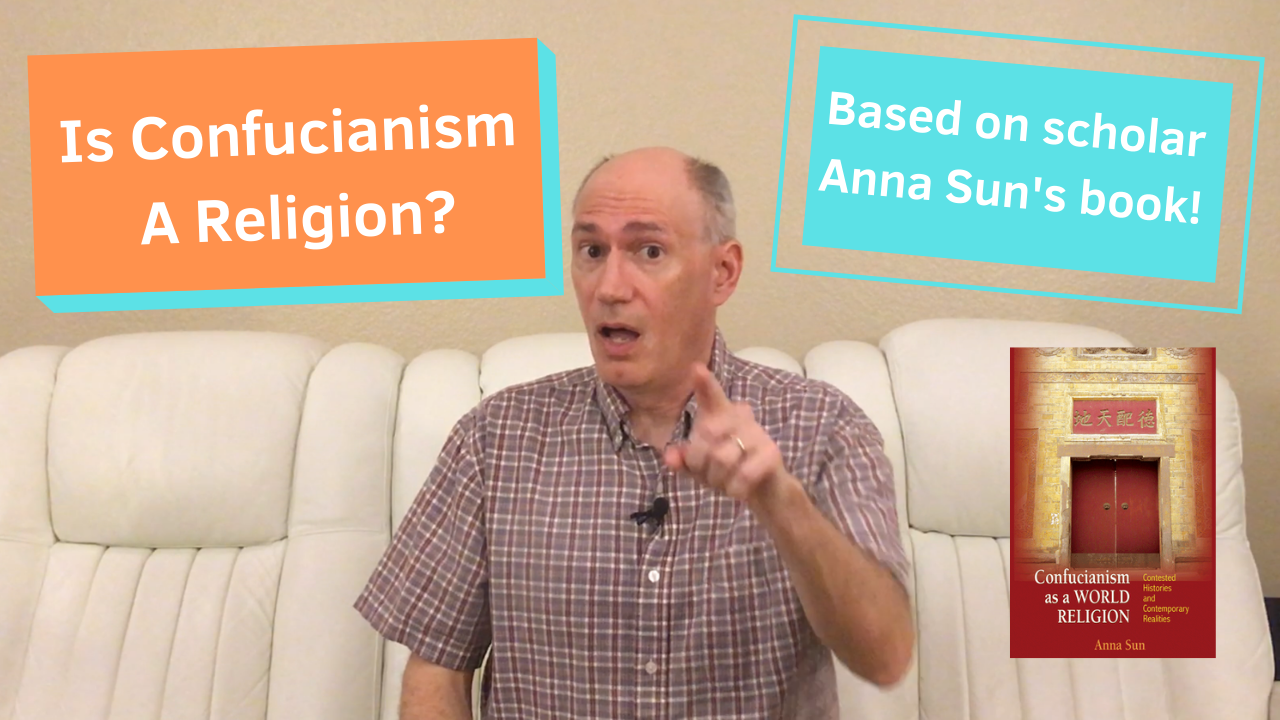02/24/2021 – Is Confucianism A Religion?

Is Confucianism a religion? This is a seriously complicated question. I’ll explain why. This is TenOnReligion.
Hey peeps, it’s Dr. B. with TenOnReligion. This video is closed-captioned here on YouTube and the transcript is available at TenOnReligion.com. Anna Sun, currently Associate Professor of Religion at Duke University, published a book back in 2013 which won multiple awards, titled Confucianism as a World Religion. If I were to sum up this book in answering the question, “Is Confucianism a religion?” I would simply say Professor Sun asks – who gets to decide if Confucianism is a religion, and on what basis is that decision made? To answer these questions, she tackles three main issues. First, how does Confucianism fit into the rise of the Western classification system of world religions in the late 1800’s and early 1900’s? Second, how has the social sciences studied Confucianism over the past century? Third, what has been the role and function of Confucianism in China’s cultural past and present? Now we’re not going to cover all of this here, so I’m going to try and narrow it down as best I can so you can get a good idea of the big picture.
Let’s start with the development of the Western classification system of world religions. James Legge was a Scottish missionary to China and later became an Oxford professor. He was an early translator of many important Chinese classical texts. In 1877, he delivered a paper at a missionary conference in Shanghai which extended the use of this new English word “Confucianism” to refer to a religion. Now this referred back to an even older controversy of how Western missionaries should translate the word “God” into Chinese, since there is no real linguistic equivalent in ancient China. So back around 1600, one Jesuit missionary, Matteo Ricci, suggested to use the Chinese term “Shang-ti” which sparked a huge debate over the status of Chinese ancestor worship in the Roman Catholic Church. Fast forward to 1877 when Legge agreed with Ricci that “Shang-ti” was an appropriate language accommodation for the Christian concept and usage of the term “God.” Other missionaries at this same meeting disagreed with him and Legge’s view was shot down. But just a few years later, things changed when Legge took this same argument from Christian missionary circles to academic circles. Legge became associated with Max Müller who was in the process of developing a new discipline which he called the science of religion, basically investigating religion in a non-confessional way. One of Legge’s main examples on why Confucianism should be a religion was that the character t’ien, which literally means “sky,” should be used as the symbol of heaven. So then Max Müller said well if t’ien means sky or day, and the same Aryan word dyu, or shine, is where we get the word Deus which comes from the Greek Dyaus-pitar, or “sky-father” [Dyaus-pitar was also how the planet Jupiter got its name.] dyu to dyaus to deus and then that became God in Latin (not sure if I pronounced all those words correctly). Because of all that, Müller said, then t’ien must also be the name of God. Of course, it doesn’t matter that Müller didn’t know a word of Chinese and Legge didn’t seem to care either as long as Confucianism was recognized as a religion, which is what he wanted in the first place. Müller, with much assistance from Legge, then went on to start publishing a huge multi-volume series of books called the Sacred Books of the East which would include the religion of the followers of Kung-fu-tze, or Confucianism. By 1893, at the World’s Parliament of Religions in Chicago, Confucianism was officially inducted into the hall of fame of leading world religions, along with Christianity, Islam, and Buddhism. Whew!
But hang on! That was just the Western side of the story. Now for the China side of the story. Two of the main issues in describing Confucianism as a religion in China are: (1) there are no conversion rites of any kind, and (2) there is no official leadership like rabbis, priests, or imams, nor are there religious organizations like synagogues, churches, or mosques. Some quick history. Sometime after Confucius died in 479 BCE he started to be venerated locally in and around his city of Qufu. This lasted until around the 300’s CE when there was a gradual integration into imperial institutions. From around 800 until 1911, Confucian rituals and teachings were fully integrated into Chinese politics and culture with the Emperor and the state taking a huge role. One behaves as a Confucian when one (a) worships in a Confucian temple, which largely amounts to burning incense or praying at a statue or tablet of Confucius; (b) One behaves as a Confucian when one practices ancestral rituals at an ancestral temple or gravesite; (c) One behaves as a Confucian when one participates in some aspect of cultural Confucianism such as filial piety, spiritual exercises, or any number of Confucian social rituals. One becomes a junzi (virtuous person) through intense self-cultivation and observing li (social rules) being guided by teachers and helped by friends. Many Confucian values have been incorporated in the very fabric of everyday life in China to such an extent that people are no longer conscious of their Confucian origins. These values have been internalized in individual lives, and they have become social norms of behavior.
In the 1950’s, the notion of the Five Major Religions in China was devised when concerns for national security and social stability forced the newly formed Communist government to find a way to deal with China’s religious population. The religion organizations, especially the Catholic Church and the Protestant churches, were large enough to pose potential threats to the socialist state. In order to gain control of these organizations, the National Bureau of Religious Affairs was established solely for the management of such groups, and these were Catholics, Protestants, Muslims, Buddhists, and Daoists. Apparently, no one spoke out for the Confucians. Many of the political leaders probably did believe Confucianism was a religion, but it was a negative force, responsible for many of the grave ills in the long history of China and now prevented modernization, thus the leaders felt the history of Confucianism was nothing but an academic project now in the new Communist China since it no longer played an active role in society.
But there’s been a slow attitude change since the early 2000’s. The controversy over the meaning of Confucianism as a religion between the older generation of Marxist scholars and the younger, more national-culture-minded individuals, is a battle over the control of Confucianism as an important cultural and political asset. The newer generation has now accepted the notion that religion is an affirmative part of human experience and are now rehabilitating the Confucian religion from the weight of the Communist denigration. In 2004, the state officially took over annual ceremonies at the Confucian temple in Qufu, Confucius’ birthplace. But why? On the one hand, the state is not interested in supporting any new religion; it has enough trouble with the existing ones. But on the other hand, the state is beginning to recognize the importance of identifying Confucianism as a unifying element in Chinese society. It is needed for the representation of a Chinese national culture in the global context, and it is also needed for the centering of the increasingly shaky collective sense of morality in the country’s fast transition into market economy and capitalism. In order to present the world with a “religion” that is compatible with the political and cultural agendas of the state, China has rediscovered Confucianism, with the hope that it is something that can be used and controlled at will, a perfect cultural symbol and political tool on the international stage, with an aura of “religion” yet without any actual religious organizations that the state has to deal with. Thus today, Confucian temples in China are not administratively under the National Bureau of Religious Affairs which controls the other five official religions in China. Instead, they are under the State Administration of Cultural Heritage and are operated as national cultural heritage sites by the government. Confucian temples are now visited by locals for religious purposes as well as being tourist attractions for both Chinese and international visitors.
So where does that leave us? Historically, to become a Confucian in China has not been about the renunciations of other religious beliefs or the exclusion of other religious practices, but rather a deepening of one’s bonds in a given community and consolidation of one’s different social and cultural identities. Moreover, to be a Confucian has meant very different things in different historical periods and in different cultural contexts in China. Again, who gets to decide, and on what basis is that decision made? Do the missionaries decide if Confucianism is a religion, the academics, the politicians, or the Chinese local populations? Are there religious aspects to Confucianism and its various associated rituals? Absolutely. Is it an organized system of beliefs with a clear structure of human authority figures? Not really.
There’s a lot more in Anna Sun’s book I didn’t cover, including voices of women in Confucianism and a bunch of great sociological data, so if you’re interested you’re going to have to check it out for yourself.
Next time we’re going to start a series on a person who calls himself a Boston Confucian. Huh? That’s it for today. I hope this vlog has helped you better understand this topic. Until next time, stay curious. If you enjoyed this, please like this video and subscribe to the channel. This is TenOnReligion.


